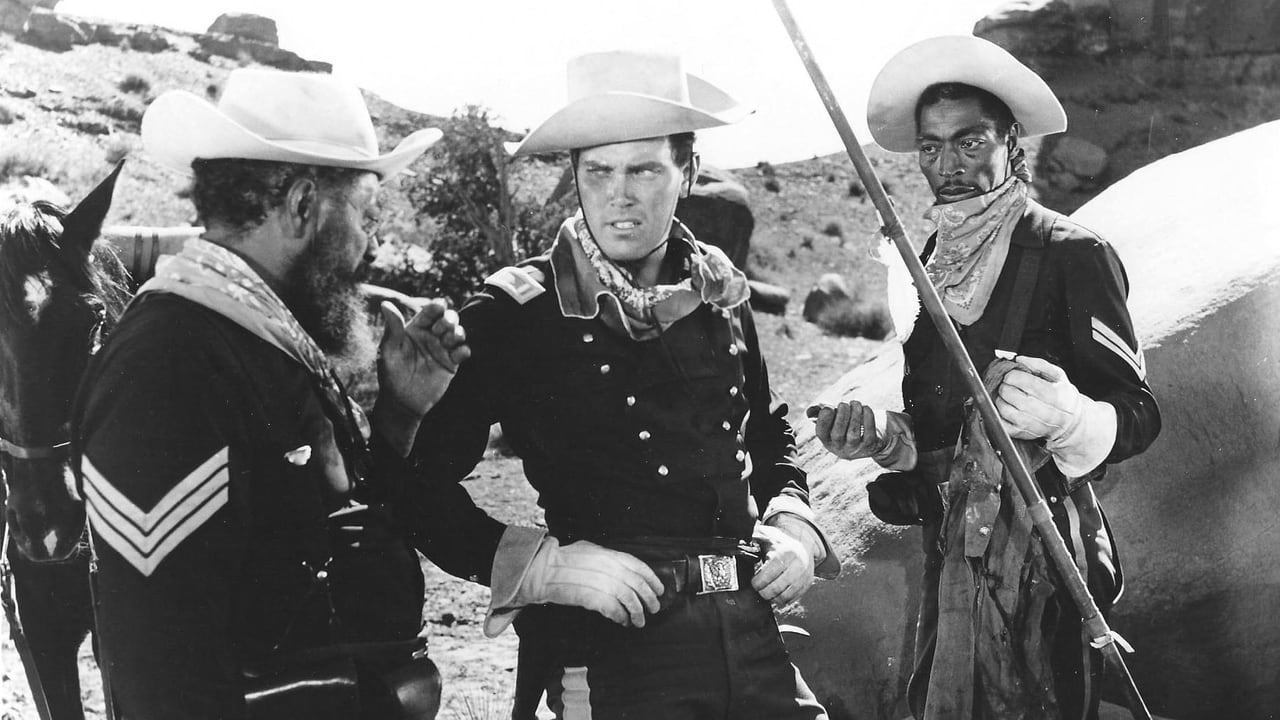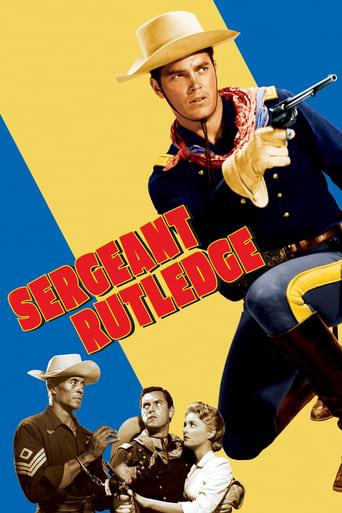Incannerax
What a waste of my time!!!
Inclubabu
Plot so thin, it passes unnoticed.
MamaGravity
good back-story, and good acting
Michael_Elliott
Sergeant Rutledge (1960) *** (out of 4) Extremely well-made and dramatic film from John Ford about a black soldier (Woody Strode) accused of killing his superior officer and raping and murdering his daughter. Lt. Tom Cantrell (Jeffrey Hunter) was the arrested officer and after spending time with the soldier agrees to defend him of the charges. In the court martial hearing we learn what really happened as Cantrell tries to save the soldier even though he admits being at the scene of the crime. SERGEANT RUTLEDGE, for some reason, never really gets mentioned when people discuss the films of John Ford and that's a shame because it's certainly one of the best films of his later period. I really enjoyed the way Ford told the story as we start off in the court room where we hear the charges and then through flashbacks we see all the events that led up to the murder and the aftermath. On a technical level Ford did a few interesting things here including how he would shoot the court scene in the dark with shadows and then cut to the flashback. This might seem like something minor but it actually has a strong impact. Ford also knew the best things to cut back to the court room scene. A lot of times when flashbacks are mixed into movies they're often done so just to move the story forward. That's not the case here because the director had to perfectly mix them with the court footage and I thought it really did a good job at building and keeping the drama from one to another. Another very strong aspect are the performances with Hunter leading the way. He never really seemed to get enough credit for his acting but the passion on display here is very powerful and I especially enjoyed the way he handled the court scenes. Constance Towers plays an important part as a witness and does a fine job as well. Billie Burke and Willis Bouchey appear in supporting roles. The real star is Strode who delivers an incredibly powerful performance and especially the scene where he must testify and finally breaks down. I don't think I'm overstating things when I say this was without question one of the strongest roles for a black actor at this period in time and Strode certainly did everything he could to make it so memorable. The actor contains a certain dignity and power that leaps off the screen. I think Ford did make one fatal mistake that really killed the film in spots and that's the horrid comic bits that are scattered throughout the film. The humor comes up in such horrid times and it's usually following something dramatic and it really kills everything that the story is trying to capture. Why Ford decided to make the humor so in your face is beyond me. With that said, the incredibly strong performances and strong story are good enough to overcome this one flaw and SERGEANT RUTLEDGE is worth viewing.
Robert J. Maxwell
John Ford's grandson, Dan, wrote of "Sergeant Rutledge" that Pappy was really feeling his age on this one and I guess he's right. There is a scene near the beginning in which a cavalry officer, Jeffrey Hunter, meets the blond young Constance Towers. The scene takes place on a train at night. But Ford didn't bother to put the interior of the railroad car on rockers. The result is a static picture of two people talking on a stationary interior set.The same carelessness extends to the rest of the film. Many of the interiors were obviously shot in the studio with painted backdrops outside the window. The few images of Monument Valley, true Ford territory, are magnificent and stand out from the rest. The writers have given the defense counsel a big mistake in the dialog. Jeffrey Hunter argues that, so far, the evidence the court has is balanced but that "one iota of evidence can tip the scales either way." Now, even the most callow screenwriter knows that evidence does not come in "iotas." It invariably comes in "shreds."There is a problem with the casting as well. Willis Boucher is heading Woody Strode's court martial. He's always a reliable blowhard. And Jeffrey Hunter is a stalwart leading man. But it's arguable that Woody Strode himself can carry such a prominent part in a film. He's a football player, not a natural actor. He has one monumental statement and handles it well but the speech is just a bit too long, about one sentence too long. The rest of the acting is below par. Ford was at that point in his career where he was ready to pass out roles to old friends, but his old friends were disappearing. This is one instance in which more of the John Ford stock company would have been a welcome substitution for actors in important roles who just can't handle it. The suave and supercilious Judge Advocate, Carlton Young, is fine but Constance Towers isn't much of an actress. Jan Styne, as the son of the suttler, Fred Libby, has the capacity to act in a routine television sitcom, and evidently has been allowed to do so. As his father, Libby is a positive embarrassment, being slapped around in the witness chair until he confesses to the rape and murder of a young blond -- "I had to HAVE her! I had to HAVE her!" He slumps to the floor and pounds the seat of the chair, sobbing and overacting. Perry Mason would never have allowed this to happen.Yet there's something enjoyable about the movie. Not just that it was made by John Ford, but that it's a courtroom drama with enough outdoor action scenes to keep a viewer interested. There are a few plot holes but what's the difference? Ford is making up for all the butchery he's visited upon minorities in the United States. "Killed more Indians than Chivington and Custer combined," he said -- or something like it. I'm too lazy to look up the exact quote. It's a little confusing but at no point is it boring. Another observation. The cavalry officers all have trouser stripes of burnt orange, whereas the legal officers wear stripes of a kind of bright platinum. I much prefer the latter. They're really spiffy. And if I were to join the post-war cavalry I would make sure I was a lawyer so I could wear those brilliant trouser strips instead of the dull gold of the cavalry.I'm giving it six points but I'm being a little generous in doing so.
SixtusXLIV
Up to now I have considered "The Searchers" the Best of Ford Westerns. It has better picture (VistaVision), and the legend of John Wayne to back it. Some of the secondary roles are better portrayed by more expert actors such as Ward Bond, just to mention one. Production is more lavish..But the plot in "The Searchers" is unidirectional. It's just a story of white settlers against Indians. Sergeant Rutledge goes much deeper, into the social "fabric" of America,To avoid fastidious repetition, let me just point that the story goes into "American Problems" that endure 100 years after. Racism, young female behavior, that affects men of power, and old rich females who own perhaps more than 50% of the total assets (the wealth of the Nation) of the USA, and last but not least, the excessive power and "tricks" of legal professionals that always leads to corruption.It is all there. If the actors were a bit upper-crust it would be the best, but Jack Warner did no provide the cash. A must see...
MartinHafer
This is a marvelous Western starring Jeffery Hunter and Woodie Strode--thanks in large part to the always wonderful direction of John Ford and the fact that this film dared to take a big risk. In the 1950s and 60s, American was still struggling desperately with racism and it was still widely acceptable to demean or mistreat Black people. However, this film deliberately tries to debunk this myth that Black people are in some way inferior. The film attacks racism without being preachy or ridiculous (something that makes me hate GENTLEMEN'S AGREEMENT due to its very heavy-handed way of dealing with antisemitism).Woody Strode, as usual, plays a very dignified and wonderful role as a soldier on trial for rape and murder. He was a very fine actor and you wonder how much further he could have gone in life had he been White. Hunter plays the man defending him and shows more than he could in most of his other pretty forgettable films. The actual story of what occurred unfolds in flashbacks told during the course of the trial and the style is very reminiscent of Akira Kurosawa's film Rashômon. This is VERY ironic, as for years, Kurosawa had been a huge fan of Ford and tried to emulate the master director! In this case, it is the other way around! The film is near-perfect in the acting, story and execution. Watch this film and see that Westerns CAN be more than just the typical horse and Indian flick.

